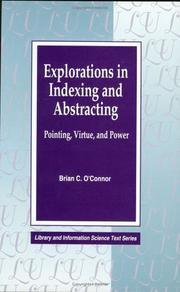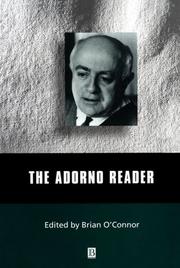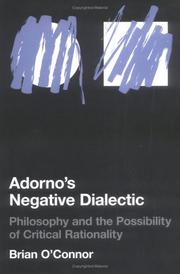| Listing 1 - 10 of 30 | << page >> |
Sort by
|

ISBN: 1563081849 Year: 1996 Volume: *1 Publisher: Englewood Libraries Unlimited
Abstract | Keywords | Export | Availability | Bookmark
 Loading...
Loading...Choose an application
- Reference Manager
- EndNote
- RefWorks (Direct export to RefWorks)
Subject indexing --- Abstract writing --- Abstracting --- Analyse de documents --- Indexation --- Indexeren --- Indexing --- Maken van uittreksels --- Précis writing --- Uittreksels [Maken van ] --- 025.4.026 --- 681.3*H31 --- Books --- Index preparation --- Preparation of indexes --- Subject analysis --- Information organization --- Filing systems --- Précis writing --- Content analysis (Communication) --- Documentation --- Rhetoric --- Annotating, Book --- Ontsluiten van (elementen van de inhoud) van documenten --- Content analysis and indexing: abstracting methods; dictionaries; indexing methods; linguistic processing; thesauruses (Information storage and retrieval) --- 681.3*H31 Content analysis and indexing: abstracting methods; dictionaries; indexing methods; linguistic processing; thesauruses (Information storage and retrieval) --- 025.4.026 Ontsluiten van (elementen van de inhoud) van documenten

ISBN: 0631210776 0631210768 Year: 2000 Volume: *5 Publisher: Oxford, UK Malden, Mass. Blackwell
Abstract | Keywords | Export | Availability | Bookmark
 Loading...
Loading...Choose an application
- Reference Manager
- EndNote
- RefWorks (Direct export to RefWorks)
Appraisal of books --- Books--Appraisal --- Criticism --- Criticism--Technique --- Critique --- Critique littéraire --- Evaluation of literature --- Filosofie --- Kritiek --- Kritiek [Literaire ] --- Literaire kritiek --- Literary criticism --- Literature--Evaluation --- Literatuurkritiek --- Philosophie --- Philosophy --- Sociologie --- Sociology --- Wijsbegeerte --- Philosophy. --- Sociology. --- Criticism. --- Adorno, Theodor W., --- Social theory --- Social sciences --- Mental philosophy --- Humanities --- Literature --- Rhetoric --- Aesthetics --- Technique --- Evaluation

ISBN: 0262151103 Year: 2004 Publisher: Cambridge-London The MIT Press
Abstract | Keywords | Export | Availability | Bookmark
 Loading...
Loading...Choose an application
- Reference Manager
- EndNote
- RefWorks (Direct export to RefWorks)
Dialectic --- Philosophy --- Mental philosophy --- Humanities --- Polarity --- Polarity (Philosophy) --- Adorno, Theodor W., --- Négativité (philosophie) --- Ontologie --- Philosophie
Book
ISBN: 0262280884 9780262280884 Year: 2004 Publisher: Cambridge, Mass. : MIT Press,
Abstract | Keywords | Export | Availability | Bookmark
 Loading...
Loading...Choose an application
- Reference Manager
- EndNote
- RefWorks (Direct export to RefWorks)
The purely philosophical concerns of Theodor W. Adorno's negative dialectic would seem to be far removed from the concreteness of critical theory; Adorno's philosophy considers perhaps the most traditional subject of "pure" philosophy, the structure of experience, whereas critical theory examines specific aspects of society. But, as Brian O'Connor demonstrates in this highly original interpretation of Adorno's philosophy, the negative dialectic can be seen as the theoretical foundation of the reflexivity or critical rationality required by critical theory. Adorno, O'Connor argues, is committed to the "concretion" of philosophy: his thesis of nonidentity attempts to show that reality is not reducible to appearances. This lays the foundation for the applied "concrete" critique of appearances that is essential to the possibility of critical theory. To explicate the context in which Adorno's philosophy operates--the tradition of modern German philosophy, from Kant to Heidegger--O'Connor examines in detail the ideas of these philosophers as well as Adorno's self-defining differences with them. O'Connor discusses Georg LucA cs and the influence of his "protocritical theory" on Adorno's thought; the elements of Kant's and Hegel's German idealism appropriated by Adorno for his theory of subject-object mediation; the priority of the object and the agency of the subject in Adorno's epistemology; and Adorno's important critiques of Kant and the phenomenology of Heidegger and Husserl, critiques that both illuminate Adorno's key concepts and reveal his construction of critical theory through an engagement with the problems of philosophy.
Philosophy. --- Dialectic. --- Philosophy --- Dialectic --- Philosophy & Religion --- Adorno, Theodor W., --- Mental philosophy --- Polarity --- Polarity (Philosophy) --- Humanities --- PHILOSOPHY/General --- SOCIAL SCIENCES/Political Science/Political & Social Theory
Book
ISBN: 0203019830 0415367352 0415367360 9780203019832 9780415367356 9780415367363 9781134210275 9781134210312 9781134210329 Year: 2013 Publisher: Abingdon, Oxon: New York: Routledge,
Abstract | Keywords | Export | Availability | Bookmark
 Loading...
Loading...Choose an application
- Reference Manager
- EndNote
- RefWorks (Direct export to RefWorks)
Theodor W. Adorno (1903-69) was one of the foremost philosophers and social theorists of the post-war period. Crucial to the development of Critical Theory, his highly original and distinctive but often difficult writings not only advance questions of fundamental philosophical significance, but provide deep-reaching analyses of literature, art, music sociology and political theory. In this comprehensive introduction, Brian O'Connor explains Adorno's philosophy for those coming to his work for the first time, through original new lines of interpretation. Beginning with an overview of Adorno's life and key philosophical views and influences, which contextualizes the intellectual environment in which he worked, O'Connor assesses the central elements of Adorno's philosophy. He carefully examines Adorno's distinctive style of analysis and shows how much of his work is a critical response to the various forms of identity thinking that have underpinned the destructive forces of modernity. He goes on to discuss the main areas of Adorno's philosophy: social theory, the philosophy of experience, metaphysics, morality and aesthetics; setting out detailed accounts of Adorno's notions of the dialectic of Enlightenment, reification, totality, mediation, identity, nonidentity, experience, negative dialectics, immanence, freedom, autonomy, imitation and autonomy in art. The final chapter considers Adorno's philosophical legacy and importance today. Including a chronology, glossary, chapter summaries, and suggestions for further reading, Adorno is an ideal introduction to this demanding but important thinker, and essential reading for students of philosophy, literature, sociology and cultural studies.
Philosophie. --- Adorno, Theodor W., --- Adorno, Theodor W. --- Wiesengrund, Theodor, --- Wiesengrund-Adorno, Theodor, --- Adorno, Teodor V., --- Adorŭno, --- אדורנו, תאודור --- אדורנו, ת. ו. --- Adorno, Th. W. --- Adorno, Theodor W., - 1903-1969
Book
ISBN: 9780691167527 Year: 2018 Publisher: Princeton, N.J. Princeton University Press
Abstract | Keywords | Export | Availability | Bookmark
 Loading...
Loading...Choose an application
- Reference Manager
- EndNote
- RefWorks (Direct export to RefWorks)

ISBN: 9780262151108 9780262651080 Year: 2005 Publisher: Cambridge, Mass. The MIT Press
Abstract | Keywords | Export | Availability | Bookmark
 Loading...
Loading...Choose an application
- Reference Manager
- EndNote
- RefWorks (Direct export to RefWorks)
Book
ISBN: 9781400889617 Year: 2018 Publisher: Princeton, NJ
Abstract | Keywords | Export | Availability | Bookmark
 Loading...
Loading...Choose an application
- Reference Manager
- EndNote
- RefWorks (Direct export to RefWorks)
Multi
ISBN: 9781400889617 9780691167527 Year: 2018 Publisher: Princeton, N.J. Princeton University Press
Abstract | Keywords | Export | Availability | Bookmark
 Loading...
Loading...Choose an application
- Reference Manager
- EndNote
- RefWorks (Direct export to RefWorks)
Philosophy --- Philosophical anthropology --- General ethics
Book
ISBN: 0691167524 0691204500 1400889618 Year: 2018 Publisher: Princeton University Press
Abstract | Keywords | Export | Availability | Bookmark
 Loading...
Loading...Choose an application
- Reference Manager
- EndNote
- RefWorks (Direct export to RefWorks)
| Listing 1 - 10 of 30 | << page >> |
Sort by
|

 Search
Search Feedback
Feedback About UniCat
About UniCat  Help
Help News
News